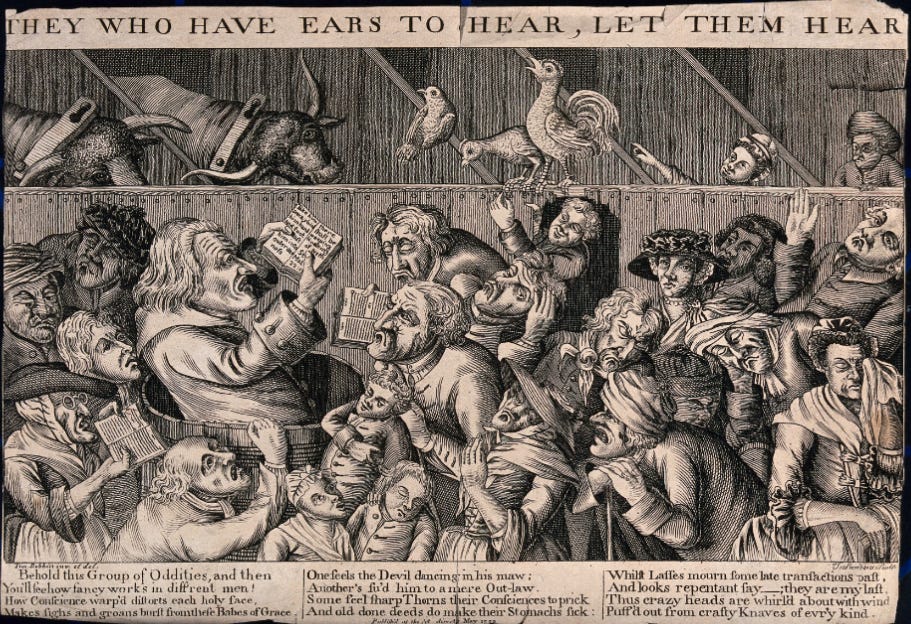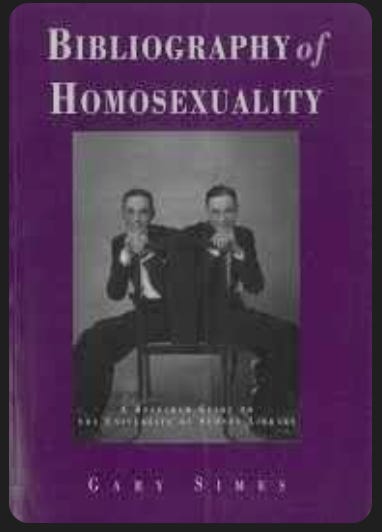GDoS Upgrade 35
Another trimester, another buncha goodies
A few stats, as usual. Of course size counts and dictionaries have no shame in advertising the fact. So all of us who suffer from syllable-envy, here’s the good oil. The database has gained a further 4759 citations, which have added clarity and on occasion extra senses to 2311 headwords. The dictionary itself has reached 57,557 headwords in which nest 68,877 senses. There are 643,685 citations to underpin them all. I have loaded it up and urge you to have a look.1
As for looking, I am moving on with my kindly gifted opportunity to read and extract material from the late Dr Gary Simes’ Dictionary of the Language of Sex and Sexuality. It is obviously not my only task, and few days begin without stripping off for a round or three facing off with some branch of French bureaucracy in pursuit of yet another piece of paper (a form, a photo, a recent utility bill, an aged certificate of birth or marriage). Sometimes there gleams that light that teasingly mimcs the tunnel’s end, but too often, as we know, such is but delusion. The oncoming papeterie is keen to entangle us once more. While we’re there, I offer a couple more words: scribouillard(e), a scribbler, thus a bureaucrat; pinailleur/euse, a nit-picker, literally someone who pisses around with pins. Nor am I alone in plumping up the lexical chook: my thanks to the usual suspects and if anyone else would like to toss in their twopennorth, my clapdish (see here) is ever-extended.
If I may, I want to expand slightly on my initial comments on Dr Simes’ work of three months ago. His mixture of the way standard and technical English and counter-linguistic slang offer a blended lexis (though one gets the sense that each party keeps much to its own side of the street) to deal with the interlinked topics for which the lexicon is named is, sadly, unfinished. When questioned he always let it be known that he was not far from a conclusion - as much as we can ever ‘finish’ any dictionary2 - but reading closely and carefully through the typescript, any observer will have to beg to differ. Those of us who were aware of the on-going, if then unseen work were surprised and of course disappointed.
This is not to criticise, though I would like to feel that such criticisms I offer would aim to strike a positive note, but this was not yet a publishable text. While many entries are filled as required and wholly alluring, many offer more bones than tasty flesh. Far from well-turned displays, they are what the butcher once termed block ornaments: odd bits of meat that were never going attain a menu. Or not until our knight of the cleaver and steel seriously remade his slab. I have no idea whether his publishers were encouraging him, or, lacking faith, had perhaps slipped silently away, but whatever the answer, I have to assume that is because of lack of support that I am looking at and benefiting from his remarkable achievemement now.
Which makes a second person (some might suggest a third, I shall explain) left in the lurch after offering up their life and skills to a largescale dictionary of non-mainstream language, using citations of every use, and thus made on ‘historical principles’ as is the OED. The first I encountered was Jonathan Lighter’s Historical Dictionary of American Slang.3 Two volumes appeared (1993, 1997) but, so it appeared, after an impressing launch volume two sold insufficiently well, or so the salespeople declared. He had reached the letter O. We shall not see what remained. Insult adding itself to injury I seem to recall that while much more was available, the research was simply tossed into some dusty cupboard, wherein to moulder.
Dr Simes was, perhaps, his own problem. Perhaps declaiming imminent success when there was in fact little hope thereof, was an error. A good publisher would have had his back, have promised support. We must assume that this never happened. If one’s work is one’s life, to have that life condemned as useless is hardly kind. But far more damaging, his health declined and refused to spare him. His death in 2017 drew a line that could not, of course, be redrawn, or postponed till some later, more convenient day. Born in 1950 he was just two years younger than me. But if he was never to attempt a single day’s new research there was so much for him to work on. It would have been, whatever its faults - and faults there must always be - one of the more remarkable acts of lexcography. By including a portion of his work in GDoS I am not trying to finish that work: the project was far too complex for that,4 but as my colleague and his friend James Lambert explained, by showing even a portion of his work in my own dictionary, readers could benefit and appreciate just what he would have achieved. It is that which I am hoping to make possible.
And the third? Dare I offer myself? GDoS has had no supportive publisher for over 15 years. If the work has continued, it is as much because of my Uncle’s Jack’s vastly generous legacy as any commissioning editor. In 2012, after its appearance in the US, the hard-copy book won a prize. It had not been submitted as a contender by my UK publisher, whose first commment on a book that a well-written contract forced them to back was ‘We do not want to publish your work’, and that was thanks to the US distributor. Out of nowhere the victory merited a call from the UK boss. I wondered whether the publishers might reverse their opinion and put something, money for instance, behind this work that they now kept praising. Shall we simply note that the answer was and ever remains as you would predict. No fucking way.
At which point I was intending some comments on what has become, at least as far as I have experienced up close and depressingly personal, of what was once a great and mighty and even, because such things are not invariably one and the same, important and influential reference book industry. But that must wait. It’s hard to justify most of what I do as these putrescent days slither past, and mourning the decline and fall of ancient information technology is likely not among them. So.
Nuff ced. Update tag new25B (used in my research database to denote material created over the second quarter of 2025) is reborn as new25C and this in turn (so long as mine continues too) will flutter out its life over the next 90 days. There will certainly be more from Gary Simes’ work. But plenty more from elsewhere too, I assure you. Jim Gibbons has only today announced that his next citations are soon en route. I cannot, and there is no breath of smart-arsery in the phrase, I cannot wait.
And an apology: the underlying tech of GDoS requires a degree of box-filling, quite literally so, to link the latest batch of books and kindred sources to the website text on which you may wish to click. This is usually fewer than 50 titles, often fewer still, but with the arrival of the Simes material we are in a new world and its name is pushing 700 (and that’s just what’s emerged from A-D) . Yes, I do count myself lucky, but some of the backstage coding - the site was written around 2015 - is a leetle clunky these days and while nasturtiums remain uncast, I am no coder. So the process whereby each of those c.700 bits of info, which must first be entered into the Bibliography one by one (check the name, the title, the pub. date and place), takes time. One then does what is required, as I say, to make the link to GDoS. And finally, I click ‘reprocess’ on GDoS (another few hours) and there it is. At the same time I like to research, to input material from my generous contributors, and even do things quite unrelated. So it takes and will continue to take time. As things stand I have resisted the reprocess. I am getting the scut-work in place and then, whenever I can, I shall offer at least a portion of where Gary Simes is taking us. The new cites, I should stress, are in place, one just can’t start searching on an entire title’s worth. Yet.
‘finish’ in lexicography’ ought almost always to be taken as a synonym for ‘publish’. The language keeps evolving, so much its representations. I lack the scholarship - perhaps there are some ancient lexes for which it can be stated without contradiction that they have offered us ‘everything’ they held, but surely such are rare - but I know without doubt that slang is in a constant ferment of evolution and re-invention.
I wrote about this disaster in 2001. A link is here: https://www.academia.edu/110450737/Language_A_Light_er_extinguished. It transpired that I got certain things wrong. But the story remains the same: a grim one.
DLSS benefits from an author who know much of what he wrote. Most slang lexicographers are, how often have I ’fessed up, too much voyeurs, lacking intimate knowledge of the worlds that produce the vocabularies they lay out. Smes knew that most important of initial processes: which were the questions he needed to ask? And then, just as vital, where to go looking for and finding the answers.



Just sent you a private letter via b'sky.
Thank you for all this. Nuff ced indeed.